- Home
- Diana Wynne Jones
Witch's Business Page 6
Witch's Business Read online
Page 6
“Oh, drat!” said Jess. “I forgot to put up the CLOSED FOR GOOD notice.”
SIX
Frank unfolded the letter. It was printed, very heavily and badly, in what appeared to be a foreign language. It said:
Erjant Bizniz cum ta too brij schreet kwik boat Busta an b ayamunga
Am Desprit
“It must be French,” he said.
Vernon looked over his shoulder. “It’s not. It’s just he can’t spell. That’s how Silas does it. You read it how it sounds.”
Jess and Frank, with difficulty, did so, and gathered that they were to go to 2 Bridge Street on urgent business about—
“What?” said Jess.
“Buster and B. Iremonger,” read Martin.
“But,” said Jess, “people just aren’t called Am Desprit. It’s not a name.”
Martin burst out laughing. “It’s not his name. It’s what he is. Desperate.”
“Daren’t put his name,” suggested Vernon, “in case Buster gets to know.”
“Well,” said Jess, “desprit or not, we can’t see him now. It’s lunchtime.”
“And we’re going to hunt heirlooms this afternoon,” Frank said. “He’ll have to wait till this evening.”
It was Martin’s lunchtime, and Vernon’s, too. They had to go.
“Come straight up, after,” Vernon called.
Frank and Jess shouted that they would, but after lunch, when it came to the point, Jess insisted that it was only fair to call at Bridge Street first. She did not like the thought of anyone being desprit.
“I bet he is, if he’s sold himself to Biddy,” Frank said. “Serve him right.”
“Oh, Frank,” said Jess, as she pedaled beside him, “suppose the penny’s dropped, and he finds himself bound slave for all eternity.”
“It’ll be more than a penny he’ll drop,” said Frank. “I want five pence at least out of him.”
“But we can’t unsell him,” Jess protested. “Not for five pounds.”
“Yes, we can,” said Frank, “if we get that tooth back. Perhaps we should ask fifty pence, come to think of it.”
But Frank was unable to ask for anything, because whoever lived at 2 Bridge Street was not at home. Frank clattered the knocker at the narrow front door of the thin little house, until a lady in curlers stuck her head out of the next-door window and told them the whole family was out. She shut the window again before Jess had a chance to ask which family it was.
Frank and Jess sighed, got on their bicycles again, and pedaled off to the big house. Vernon was waiting for them at the gates.
“How’s Silas?” Jess asked him.
“Running a fever now,” Vernon answered miserably.
“How mean!” said Jess. “How wicked of Biddy! You must be glad it wasn’t you, Vernon.”
“I wish it was,” Vernon said. Jess could see he was quite wretched about it.
“Look, it’s our fault, too,” she said. “And we’ll find that necklace and spite her.”
The problem, they soon realized, was where to start looking. The big house, across a large lawn, sitting up on a hill, was very big indeed. It was the kind of house which is all long, blank windows. Behind it, there were stables, sheds, greenhouses, and gardens. There seemed no end of possible places in which to hide necklaces.
“Is it old at all?” Frank asked Martin, who came sauntering down the lawn to meet them. “I mean, could there be secret panels and things?”
“Not that old,” said Martin. “There is paneling, but the builders had most of it out when we moved in. I know, because I was watching for hiding places. It was rather exciting, actually—except there wasn’t anything. But Vernon’s thought about it.”
Vernon, who was still very miserable, sighed. “Like this,” he said. “If it was Biddy hid the stuff, she’d have to do it quick, not to be noticed. And there’s not many places left after the builders went at it. So I think we look in the ways out and in the sheds and gardens first.”
“What if she buried it?” Jess asked.
“If she did that,” Vernon said, sounding very fierce, “then we’ll have to go and see her again. Maybe we can push her into dropping hints, like this morning.”
“And push ourselves into Buster’s arms,” Frank said.
“Risk that,” said Vernon. “It’s worth it. Let’s hunt.”
They walked up the lawn, trying to decide who should look where. Frank became rather embarrassed. There seemed to be a lot of people around, peacefully walking about the lawn, or wandering in and out of the various doors of the house. They all stared curiously at the children. Some, who were playing croquet at one corner of the house, leaned on their mallets to watch them.
“Who are they all?” Frank asked Martin.
“They’re the guests,” said Martin. “You knew this was a convalescent home, didn’t you?”
Neither Frank nor Jess had known. They mumbled and tried to pretend they had.
“We have to call them guests,” Martin explained, “to humor them. They’re nearly all retired loonies really, you see, and we call them guests to show them how much better they are. But you don’t have to worry. They’re quite harmless and sensible most of the time.”
After this explanation, Jess hurriedly suggested that she and Frank should hunt in the gardens. The idea of prying about in mad guests’ bedrooms was too much for her.
“Okay,” said Martin. “Vernon can take on the back hall and the piece of paneling in the kitchens. I’ll do the rest indoors, and join you outside if we don’t find anything. Don’t take any notice of the guests. They’re all bored stiff and gape like fishes if anyone hiccups, but they’re quite harmless.”
Harmless, Jess decided, was not quite the right word. This was after she had left Frank rooting about in the stables and set off by herself into the gardens at the back of the house. There were a whole lot more guests there. Two fat, red ones were playing tennis. A whole line more sat in deck chairs, with rugs over their knees, all along the back of the house. They were all elderly and, as soon as Jess appeared, all their heads turned, as if someone had threaded them on a string and then pulled it.
Unfortunately, there was a long row of stone urns just in front of these guests. Jess went along, searching in each one, and the row of heads followed her every movement. Jess had found ten empty cigarette packets and an old lollipop, when one old lady could plainly bear no longer not knowing what Jess was looking for.
“Have you lost anything, dear?” she asked.
“No. Thank you. It’s not me,” Jess said. She scrabbled hurriedly in the last urn, and found a toffee. It stuck to her fingers.
“Put it down, dear,” said another old lady. “You don’t know where it’s been.”
“Yes, I do,” said Jess. “It’s been in here for months, by the look of it, and I’d put it down if it wasn’t stuck to me.”
“Little girls,” said a sharp old gentleman, “should be seen and not heard.”
“You spoke to me,” said Jess. “And I’d be invisible if I could, I promise you, the way you all stare.”
“How dreadfully rude!” said the first old lady. The others all clucked and nodded their strung-together heads until Jess could not bear it any longer. She fled through a door in a wall nearby, frantically trying to unstick the toffee. She got it off her right hand and it stuck to her left.
“Oh, bother, bother!” said Jess, running across more lawn with her head down. The toffee fastened itself to her right hand again.
“Little girl!” called somebody. “Little girl, come here.”
Jess looked up from the toffee to find that she was in a small, walled-in garden, with trees against the walls. The person who had called her was another lady guest, sitting in another deck chair beside some daffodils. This lady was not as old as the others and she was holding out a paper handkerchief.
“Here you are,” said this lady. “Get it off with this.”
Jess went over to her gratefully. “Thank you,�
�� she said. “Vernon had a nosebleed into mine this morning.”
“Oh, yes,” said the lady. “I know Vernon. At the Lodge. Are you a friend of his?”
“I suppose so,” said Jess, busily peeling the toffee off her fingers into the tissue. “Business associate would be more like it, though.”
“Really?” said the lady. Jess found the lady looking at her very carefully indeed. She was a pretty lady, with clouds of fair hair and big dark eyes, but she made Jess feel uncomfortable. There was something intense about her. Jess began to back away. She had a feeling that maybe this lady was madder than the other guests and, Jess thought, with Biddy and the Aunt, that would make three mad ladies in one day. Two was plenty.
“I’ll have to go now,” said Jess.
“In a minute,” said the lady, so firmly that Jess stood still. “Now,” said the lady, “I have a feeling about you, little girl. You’ve been meddling with people’s worse natures, haven’t you?”
“I haven’t,” said Jess, rather indignantly. “I wouldn’t know how to.”
“I think you would,” the lady answered. “Everyone knows how to do that. We may disguise it from ourselves by calling it a kindness to someone else—as I did—or telling ourselves that it’s only fair to do whatever it is, but the fact remains that we’ve done a bad act disguised as a good one. And I have a feeling that’s just what you’ve done.”
“I don’t think I have,” Jess said uncomfortably.
“Are you quite sure?” the lady asked, staring up at Jess with her intense dark eyes. “Quite sure? You said something about business just now that didn’t sound altogether right to me.”
Jess twisted her head sideways to avoid the lady’s look. “Well, yes, I am here on business,” she admitted, and looked round at the daffodils, the trees, and the walls in search of something else to talk about. “Nice weather,” she suggested.
But the lady was not to be distracted. “And are you quite sure your business has nothing to do with evil?” she said. “I have to ask you because I’ve spent the last five years paying for what I did, and I’d hate you to do the same. Have you been meddling with people’s worse natures?”
“I—I—” stammered Jess. Then she thought of Own Back. She supposed that was just what it was. “Yes, I think I have,” she said. “But I didn’t mean to. It just happened.”
The lady smiled sadly. “That’s what we all say,” she answered. “Someone says: Do me this favor, and I’ll give you six pence, or a pound, or whatever it is. And you see no harm, and you do it. I did someone a favor once, for a half-crown bus fare, and it’s taken me all this time to work it off. I hope you didn’t let whoever it was pay you anything.”
“No—I—at least, they haven’t yet,” Jess said. “Should I cancel it, then?”
“Most certainly,” said the lady, “if it’s anything at all bad. Just in case.”
“All right,” said Jess. “I will, then.” She was longing to get away. This lady made her more uncomfortable than she had ever felt in her life. “Can I go now?” It was worth having no money just to be able to go.
“In a second,” said the lady. “I’m going to give you these first. Have you a chain or something to hang them on, so that you won’t lose them? They’re very precious.” She held out her hand and showed Jess two little oval-shaped things. Jess at first thought they were beads, each with a hook in one of their longer sides. “Eyes,” said the lady. Jess saw that they were. Each bead was a little tiny model of an eye, one blue, one brown. “They ward off evil,” the lady explained. “The evil eye particularly. I’m strong enough to do without them now. So I’ll give them to you, because I think you need them more than I do. What’s your name?”
“Jessica,” said Jess.
“And so is mine!” said the lady. “That is nice. Now, find a chain.”
Jess remembered that she still had her charm bracelet in her pocket. She fetched it out, and the lady helped her hook the little eyes on it. They became quite friendly over it. Jess was almost sorry when the lady said, “Now, run along, dear. You’ll be safe now, provided you don’t do a bad act disguised as a good one.”
“Thanks,” said Jess. She looked back at the lady when she reached the door in the wall, but the lady was leaning back in her deck chair and seemed to have forgotten about her. Funny, Jess thought. She’s nice, even if she is mad. I wonder who she is.
She forgot about it the next minute, however, because as soon as she came out at the back of the house, the row of heads in the deck chairs turned, following Frankie and Jenny, hurrying and limping past the line of urns. Frankie saw Jess and dragged Jenny over to her.
“We came,” said Jenny, “but not to look, because we can’t think of anywhere we haven’t looked, here.”
“Then we’d better look in your house,” said Jess. “I’ll tell Vernon, shall I?”
“Yes,” said Frankie. “But Biddy knows you’re looking. I know she does.”
“How?” said Jess. “Who told her?”
“We think Daddy did,” said Jenny. “He does things for her. We told you. And Aunt heard us while she was painting you, and we heard her talking to Daddy, and Daddy went down to Biddy’s hut straight after lunch.”
“Oh, no!” said Jess. “But couldn’t you stop him? I mean, he seems quite nice. Surely he wouldn’t do a thing like that if you explained?”
“We have,” said Frankie. “But he’s in her power, so it’s no good.”
“But he’s grown up!” said Jess. She just could not credit that Biddy could have power over a real grown-up person.
“I know,” said Frankie, “but he does what she wants. Always.”
“We’d better tell Vernon,” said Jess. “Hurry.”
The three of them set off again, round the house, and the row of heads once more turned to watch them. Jess was glad when they were out of sight and gladder still when they ran into Frank and Vernon coming the other way. Vernon was gloomy, because he had found nothing. Frank was cross, because he had tried to search the greenhouses and Mr. Wilkins had very sharply ordered him off. He was crosser still when Jess told him Frankie’s news.
“Don’t tell me she can magic grown-up men,” he said. “It’s just nonsense.”
“I bet it’s not,” Vernon said seriously. “That’s how it looked this morning.”
“Yes, it did,” Jess agreed.
“It looked like my big toe, then,” said Frank.
“But she knows,” said Jess. “Look.” She pointed behind Frank and Vernon.
Everyone looked, and there were Buster and his gang, trotting toward them up the large front lawn.
“Now do you believe it?” said Vernon to Frank.
Nobody else said anything. Frankie seized Jenny’s arm, and they all five turned and ran. Behind them, the gang screamed and came racing after. Round the house went Vernon, Frank, Jess, looking over her shoulder, and Frankie, towing Jenny. Round the house, close on their heels, came Buster, Stafford, and the other seven. Round to watch them swung the row of guests’ heads.
“We’ll get you this time, you vampire-sludge scumbag!” roared Buster.
“Lousy stomach-maggot Piries!” yelled Stafford.
“Sweet sliming Fanny Adams!” screamed the rest.
The row of heads turned as they all streamed past. “My gracious! What language!” Jess heard a lady say. The whole row settled its rugs on its knees and watched with interest. Jess could have shaken them all. None of them so much as asked if they needed help.
“My dad’s in the greenhouse,” Vernon panted.
“I know,” said Frank. He was quite sure Mr. Wilkins would not understand, but he pelted after Vernon toward the far corner of the house. Behind him, Jess saw that Frankie could not pull Jenny fast enough to keep up. She turned back and seized Jenny’s other arm. She and Frankie almost swung Jenny off her feet between them, for the gang had nearly caught up. Frank saw the girls were not there and stopped. Vernon at last realized what was happening and ran round in
a circle and back to Frankie, shouting:
“Give her here. I’ll carry her.”
In the confusion, the gang ran on too far and stopped also, in a line, between them and the greenhouses. Buster laughed.
“Gotcha!” said someone.
“You have not!” said Vernon. He lugged Jenny away from Frankie and Jess, and ran on round the house, carrying poor Jenny anyhow, with her head hanging down, and her feet waving in the air. Jess took Frankie’s hand, Frank took Jess’s, and together they tore after Vernon—slap bang into the middle of the game of croquet. Guests leaped out of their way. Frank nearly fell over one of the balls, and Jess kicked another clean across the lawn into a clump of bushes.
“I say!” said a guest. “That won’t do.”
“Help!” said Jess.
“I beg your pardon?” said the guest.
“Oh, bother you, then!” said Jess, and chased on after Vernon. And Vernon, unable to see his own feet because of Jenny, tripped over a croquet hoop, dropped Jenny, and fell on his face.
Buster, who had been hanging back at the edge of the game, probably a little nervous of the guests and their mallets, summoned his courage, gave out his very worst word, and led the gang charging out among the guests.
“I say!” said the guest again. “Look here!”
Frankie, with her head down, looking very determined, raced across to Jenny and dragged her up. Frank ran to help Vernon and tripped over the same hoop himself. Jess was left stranded between a row of startled guests and the charging gang. The guests were obviously useless. It was just as useless to run away. So Jess put her head down and charged at the gang.
“You beastly horrible bullies!” she screamed.
To her amazement, all nine of them stopped dead. Buster, who was the nearest, began to back away, screwing his face up against her. “Hey!” he said. “You body-parts well stop that, Jessica Pirie. What are you doing?” Behind him, Stafford fell over another croquet hoop in his hurry to get away. Jess could hardly believe it and could not understand it at all, but she went on toward them.

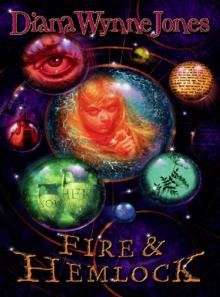 Fire and Hemlock
Fire and Hemlock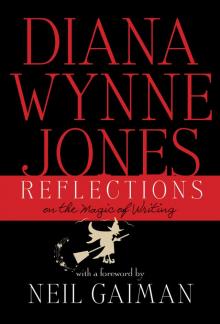 Reflections: On the Magic of Writing
Reflections: On the Magic of Writing The Game
The Game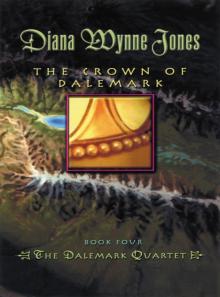 The Crown of Dalemark
The Crown of Dalemark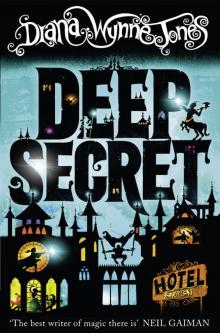 Deep Secret
Deep Secret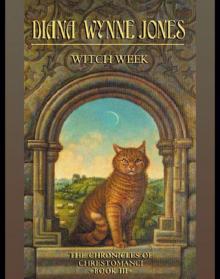 Witch Week
Witch Week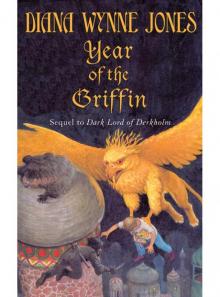 Year of the Griffin
Year of the Griffin Wild Robert
Wild Robert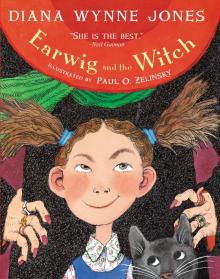 Earwig and the Witch
Earwig and the Witch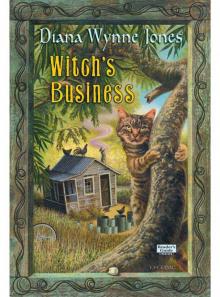 Witch's Business
Witch's Business Dogsbody
Dogsbody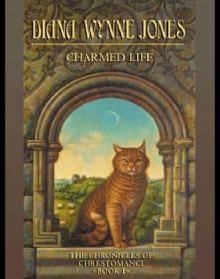 Caribbean Cruising
Caribbean Cruising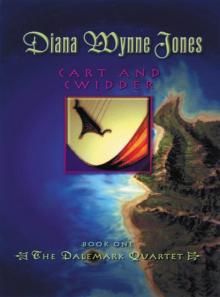 Cart and Cwidder
Cart and Cwidder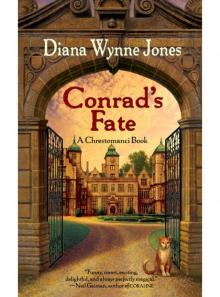 Conrad's Fate
Conrad's Fate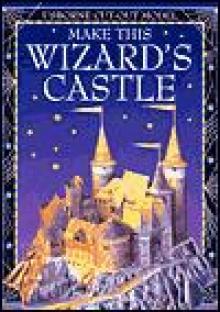 Howl's Moving Castle
Howl's Moving Castle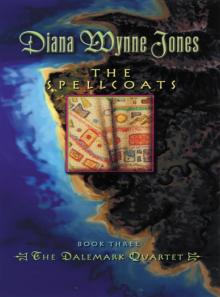 The Spellcoats
The Spellcoats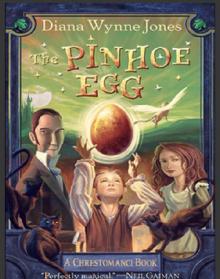 The Pinhoe Egg
The Pinhoe Egg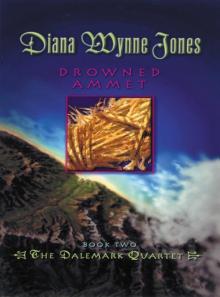 Drowned Ammet
Drowned Ammet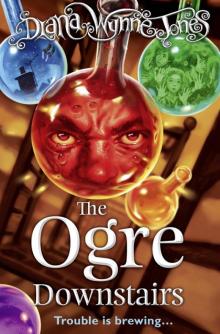 The Ogre Downstairs
The Ogre Downstairs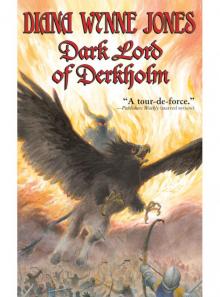 Dark Lord of Derkholm
Dark Lord of Derkholm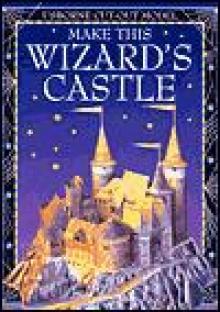 Castle in the Air
Castle in the Air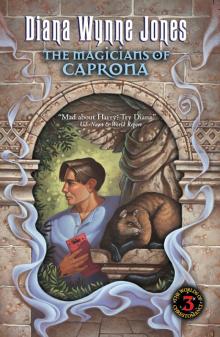 The Magicians of Caprona
The Magicians of Caprona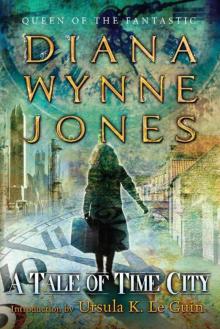 A Tale of Time City
A Tale of Time City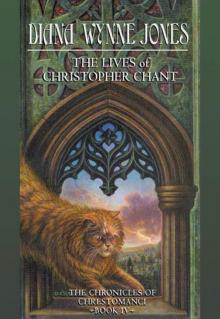 The Lives of Christopher Chant
The Lives of Christopher Chant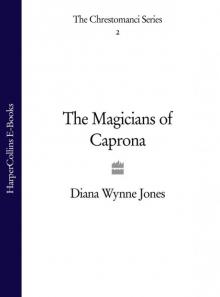 The Magicians of Caprona (UK)
The Magicians of Caprona (UK)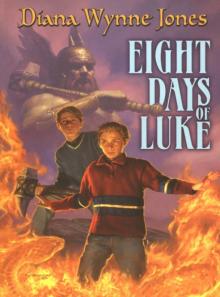 Eight Days of Luke
Eight Days of Luke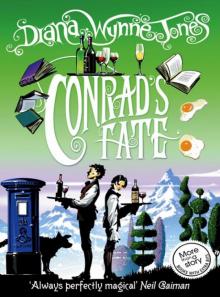 Conrad's Fate (UK)
Conrad's Fate (UK)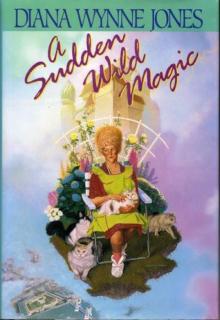 A Sudden Wild Magic
A Sudden Wild Magic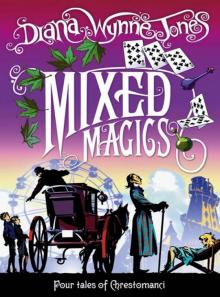 Mixed Magics (UK)
Mixed Magics (UK)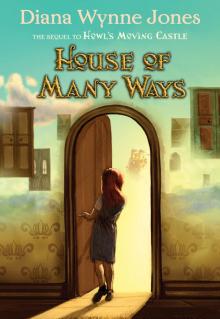 House of Many Ways
House of Many Ways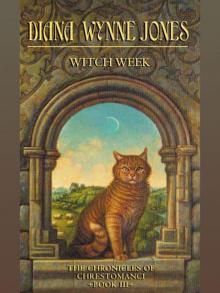 Witch Week (UK)
Witch Week (UK)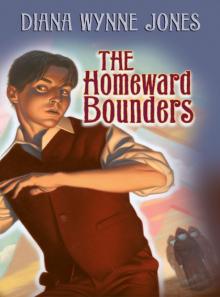 The Homeward Bounders
The Homeward Bounders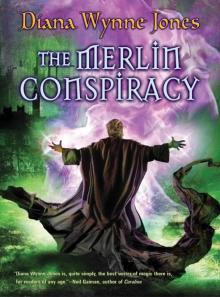 The Merlin Conspiracy
The Merlin Conspiracy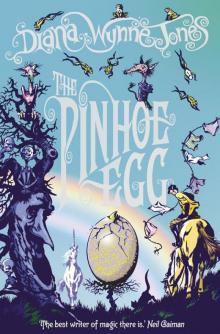 The Pinhoe Egg (UK)
The Pinhoe Egg (UK)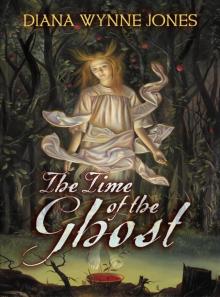 The Time of the Ghost
The Time of the Ghost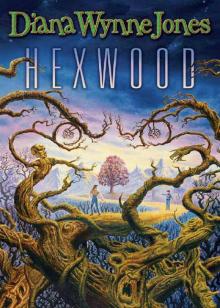 Hexwood
Hexwood Enchanted Glass
Enchanted Glass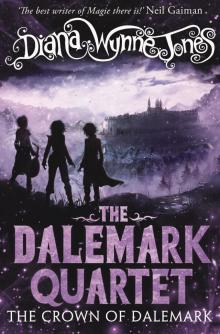 The Crown of Dalemark (UK)
The Crown of Dalemark (UK)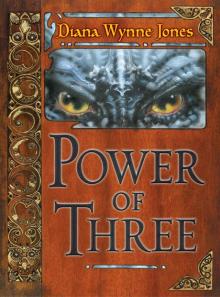 Power of Three
Power of Three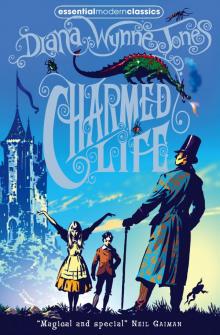 Charmed Life (UK)
Charmed Life (UK)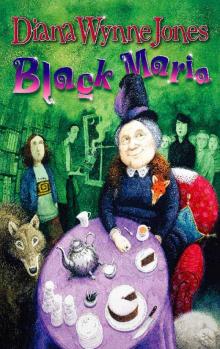 Black Maria
Black Maria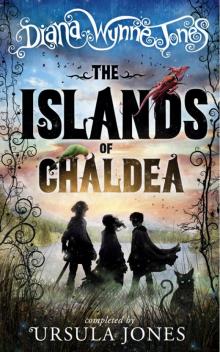 The Islands of Chaldea
The Islands of Chaldea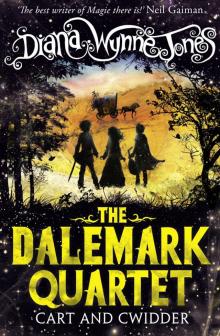 Cart and Cwidder (UK)
Cart and Cwidder (UK)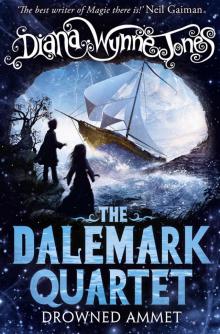 Drowned Ammet (UK)
Drowned Ammet (UK)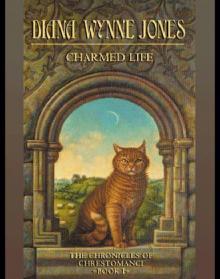 Charmed Life
Charmed Life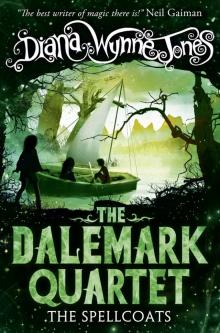 The Spellcoats (UK)
The Spellcoats (UK)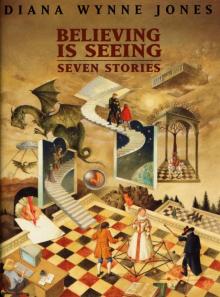 Believing Is Seeing
Believing Is Seeing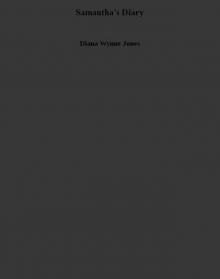 Samantha's Diary
Samantha's Diary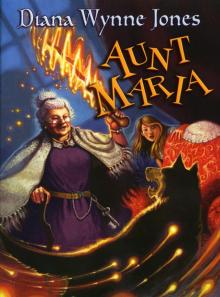 Aunt Maria
Aunt Maria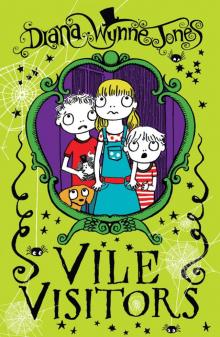 Vile Visitors
Vile Visitors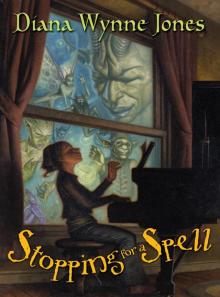 Stopping for a Spell
Stopping for a Spell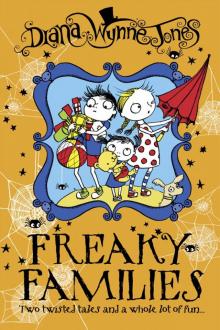 Freaky Families
Freaky Families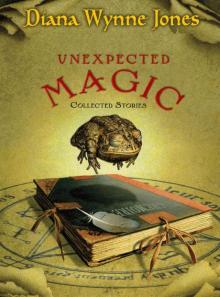 Unexpected Magic
Unexpected Magic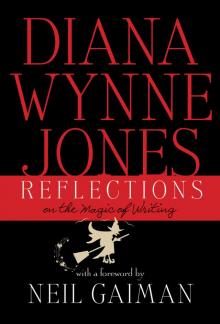 Reflections
Reflections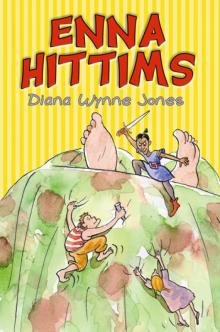 Enna Hittms
Enna Hittms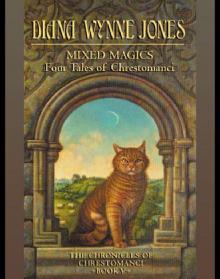 Mixed Magics: Four Tales of Chrestomanci
Mixed Magics: Four Tales of Chrestomanci